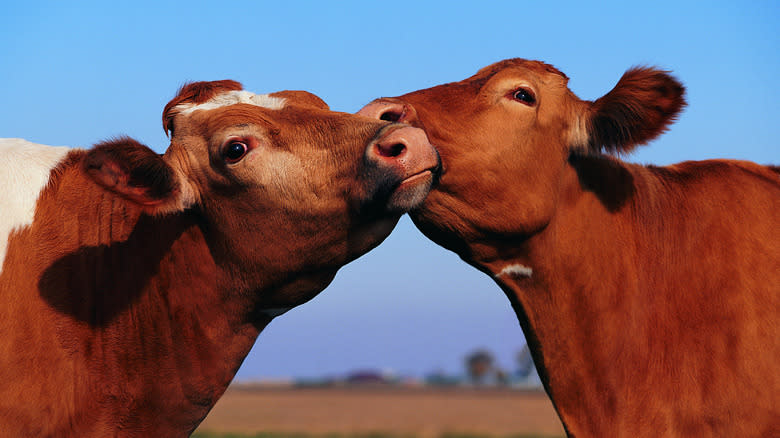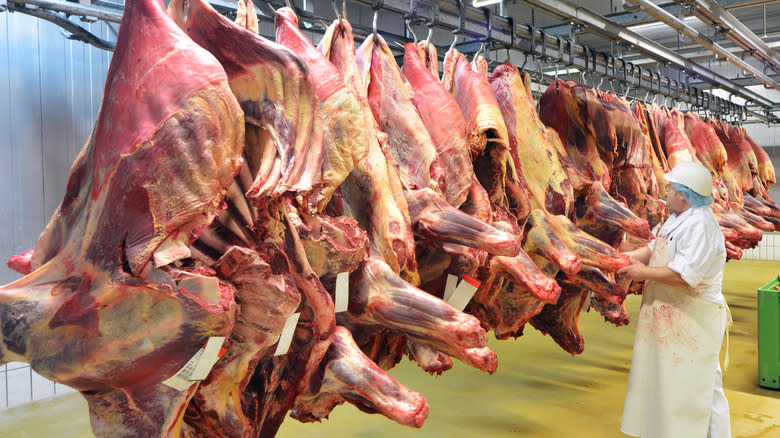The Shopping Tip You Need When Searching For Cruelty-Free Meat

There's no legal definition of terms like ethically, responsibly, or thoughtfully raised. The marketing of a carton of eggs or a pound of ground beef can make it seem like you're getting your animal products from a picturesque family farm where the farmer snuggles their cows at night. The reality, however, can be very different. And, for someone who is trying to be as conscientious about their meat consumption as possible, it means a whole world of potential pitfalls.
If you're able to find a local farm or ranch, one of the most economical ways to buy humanely raised meat is to buy a whole animal. That doesn't mean you're bringing Bessie-the-cow home to your backyard -- it means that when the animal is slaughtered, you'll get all the usable parts, butchered into familiar loins and steaks and other cuts you'd see in the store. You'll likely even be able to request which cuts you want in a half or quarter-animal order and customize how thick the cuts are. And, most importantly, you'll have full control of where your meat is coming from. You'll be able to do your own investigations into animal and labor conditions, antibiotics and feeding practices, and environmental impact. You might even be able to visit the farm or talk to the rancher. If you don't know what cruelty-free or humane means to you yet, Certified Humane is a certification organization that can offer a comprehensive starting point with its standards.
Read more: The 13 Best Steaks For Grilling
Finding A Farm For Bulk Meat Purchases

A quick Google search for "whole animal bulk meat" plus your state will give you anywhere from a handful to dozens of farms to choose from. Most farms will require you to drive to their butchers to pick up the meat, but some ship in-state or within a certain radius. Florida Premium Beef out of Glen Saint Mary, Florida, for example, will deliver anywhere in Florida and offers a free pickup at the local farmer's market. If you're not sure of the best farm to go with, see if local, reputable farm-to-table restaurants have their vendors listed on their websites. You might be able to chat with them about why they chose that farm over others.
When choosing the most ethical meat directly from a farm, know that it's not all on the labels. You may be able to find certain humane certifications like Global Animal Partnership, Regenerative Organic Certified, Animal Welfare Approved, or Certified Humane on packages in the store, but certifications cost money. Certifying something as organic can often be out of reach for smaller farms who can't afford it or can't keep up with the paperwork required. When choosing a farm, look for signals like "100% grass-fed," or "pasture-raised," or "rotational grazing" for cows. Ask the farmers if they use gestation crates with their pigs (that's a known cruel confinement system). Find out if they're pasture-raising higher welfare breeds of chickens rather than fast-growth breeds. It's okay to ask questions.
Buying A Whole Cow

TX GrassFed, a company out of Northern California, breaks down the cost for a whole cow if you're buying it from them, using one of their butchers. There's a $200 butcher harvest fee, a $1.50 per pound cut, a wrap fee, and of course, the fee for the actual meat per pound, known as the hanging weight (post-slaughter processing, pre-butchering). If the farm you've chosen sells by live weight, then know that the take-home meat from that will generally be about 40% of the total live weight. For 400 pounds of butchered meat out the door and ready for your chest freezer will be between $9.50 and $9.75 per pound. Other farms will have different pricing: The final per-pound price from Showalter's Country Meats in Kentucky will be about $6.35 per pound for the finished weight. Compare that with a filet mignon from Omaha Steaks: An 8-ounce filet from your whole cow will cost around $2.81 to $4.62 versus paying $69.99 from the famous mail-order butcher.
It will usually be less expensive to buy in bulk directly from the farmer than to buy the same quality via retail. Not only does the farmer not have to go through the same packaging and distribution logistics and cost, but you're usually not getting an added profit margin tacked on from Whole Foods or your local co-op. Sometimes it can be a little more expensive than retail, but do you have photos of the brisket you picked up from Whole Foods enjoying a sprawling field of grass beneath a mountain vista?
Read the original article on Daily Meal.

